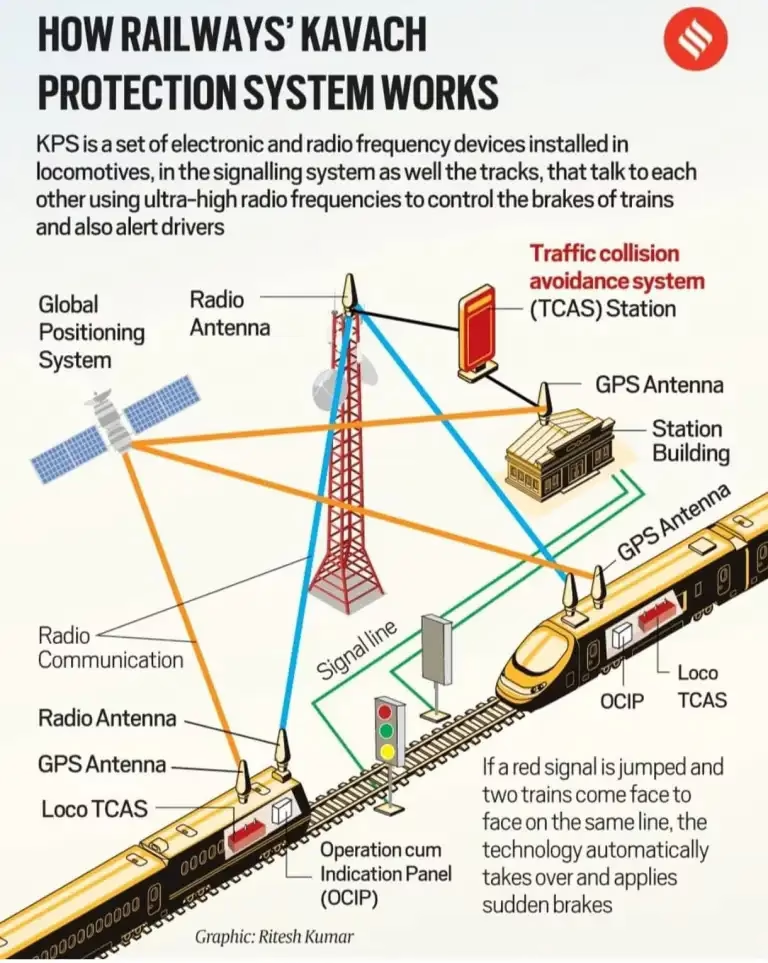Kavach is India’s very own advanced Automatic Train Protection (ATP) system developed by the Research Design and Standards Organisation in collaboration with the Indian industry to prevent train collisions by automatically activating the braking system of the train.
This technology features an electronic device linked with radio frequency identification systems positioned at stations, trains and tracks. If a loco pilot inadvertently skips a red signal, Kavach automatically activates and controls the train’s braking systems.
Additionally, the system detects any trains approaching the same tracks, taking necessary actions to avert collisions and alerting the loco pilot.
Train Collision Avoidance System (TCAS) or Kavach includes the key elements from already existing, and tried and tested systems like the European Train Protection and Warning System, and the indigenous Anti Collison Device.
In October 2022 and December 2023, four contracts were awarded for the installation of Kavach on 789 kilometers of track and 90 locomotives, with a completion period of 24 months. So far, successful trials with locomotives have been completed on 405 kilometers of the total track. The target for the FY 2024-25 is to cover 735 kilometers.
Basic Features of KAVACH:
1. Allows trains to operate at permissible speeds.
2. Assists loco pilots in preventing Signal Passing at Danger (SPAD).
3. Provides continuous speed supervision.
4. Displays signal aspects and movement authority in the loco pilot’s cab.
5. Offers protection against potential collisions.
Recommendations of Debroy committee on Railway Reforms
Debroy committee was constituted on September 22, 2014 and submitted its final report in June 2015.
The committee dealt with a range of issues related to the Indian Railways from decision-making structure, accounting system, human resource management & employee costs, multiplicity of different channels of entry into the IR, high revenue expenditure and low capital expenditure, financial status to setting up an Independent Regulator etc.
The committee had made a total of 40 recommendations, out of which, 19 were fully accepted, 7 were partially accepted and 14 recommendations were rejected.
At the top of the recommendation was liberalisation of Indian Railways. While clarifying that by the term “liberalisation”, it does not mean “privatization”, the committee said that the entry of new operators into railways will be a viable option for encouraging growth and improving services.
The committee also said that a regulatory mechanism to promote a healthy competition and to protect the interest of all stakeholders is an essential prerequisite.
While some of the recommendations have been taken on board: including the phasing out of the separate Rail Budget, the redesignation of the Chairman of Railway Board as Chief Executive Officer (CEO) and a plan to accord more powers to General Managers (GMs) and Divisional General Managers (DRMs) to take decisions “independently”, the overarching recommendation on “liberalisation” of Indian Railways has not been taken on board yet.
It was the Debroy expert panel which recommended that the chairman of the Railway Board be re-designated as CEO to expedite decision making.
It was accepted by the government and the first Chairman and CEO of Railway board was appointed in September 2020 after the government reconstituted the board in new form.
Source: Indian Express

